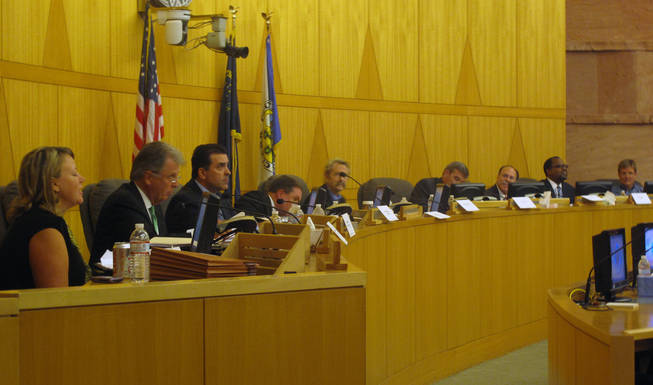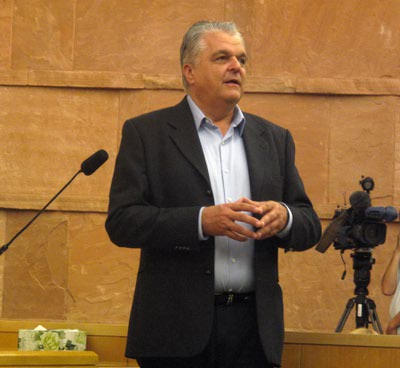
A nine-member panel meets Oct. 18 in the Clark County Commission chambers to discuss the coroner’s inquest process and listen to public feedback. From left are Margaret McLetchie, Bill Maupin, John Fudenberg, David Roger, Christopher Blakesley, Doug Gillespie, Phil Kohn, Richard Boulware and Chris Collins.
Tuesday, Nov. 16, 2010 | 1:55 a.m.
Sun archives
- Coroner’s inquest review panel proposes changes (11-8-2010)
- Coroner’s inquest review panel weighs scrapping jury, verdict (11-2-2010)
- Inquest panel considers removing verdict from process (10-25-2010)
- Public critical of inquest process at review panel’s first meeting (10-19-2010)
- Group to propose changes to coroner’s inquest process (10-5-2010)
- Police officers found justified in Erik Scott shooting; family plans lawsuit (9-28-2010)
- Vegas police study policy after drug raid slaying (8-4-10)
After months of public outcry over perceived injustices of the coroner’s inquest process, possible changes will be introduced at today’s Clark County Commission meeting.
And this is something that’s got Commissioner Steve Sisolak a little worried.
In October, Sisolak spearheaded creation of a nine-person panel that met four times and analyzed the inquest process from head-to-toe. After four meetings scheduled for four hours each – sometimes running well into five or six hours – the panel voted on recommendations last week and the county drafted a proposed revision to the ordinance.
Sisolak said he agrees with most of the changes, but one in particular is a game-changer: the inclusion of an ombudsman to represent the family and the public during inquest proceedings.
“The ombudsman is changing the whole tenor of the situation,” Sisolak said. “That became a major issue and it didn’t get brought up until the third meeting. It’s such a major change that needed to be vetted a lot further.”
The presence of an ombudsman – or “ombudsperson,” as the ordinance refers to it – originally was suggested by Sheriff Doug Gillespie. However, his suggestion was that the ombudsperson would represent both the family and police.
Due to possible conflicts of interest, the panel decided the ombudsperson would be a representative for the public and the family, while police officers would have their own representative.
But Sisolak worried the panel wasn’t clear enough on the ombudsperson’s role, or in deciding where the person would come from. He said there was no talk of who that person would be, if he or she would have investigative powers and how that person would be paid.
“Are they paid out of some fund with no money in it?” Sisolak asked.
UNLV law professor Christopher Blakesley, the chairman of the inquest panel, said inclusion of an ombudsperson was the best option the divided panel could agree upon. He suggested the county commission could get a panel of attorneys to serve for a minimal fee or for free.
“I understand Commissioner Sisolak’s position but I don’t think it’s that bad. It was a compromise,” Blakesley said. “The alternative is to have an attorney for family members … asking questions. That person ostensibly would represent the public. On the other hand, it frankly helps to have a more independent individual.”
Panel member Margaret McLetchie, an ACLU of Nevada attorney, supported the idea of having the family’s attorney act as the ombudsperson, saying it would be easier for the attorney of the family to directly question witnesses and police officers.
“There was an effort by the vast majority to come up with something,” McLetchie said. “(The recommendation) wasn’t everyone’s favorite. The only obstacle is logistics and how they’re chosen or paid. Those are more procedural obstacles.”
Under the proposed ordinance, attorneys would attend two pre-inquest conferences where they, the family, police officers and an ombudsperson would receive investigative files and determine what facts the jury would find. During the proceedings the attorneys would submit questions for the ombudsperson to ask.
The topic of whether attorneys should be able to question police officers directly was heavily debated during the inquest review meetings.
Chris Collins, executive director for the Police Protective Association, spoke adamantly against police officers being questioned. While McLetchie and Blakesley suggested they’ve reached a compromise through use of an ombudsperson, Collins said he’s unhappy with the proposed changes.
“The officers are charged with nothing and there’s no wrongdoing,” he said. “I don’t think they should have to endure cross-examination. There’s going to be some form of litigation (after the inquest). They’re going to have to testify in court. They’re going to get their turn.”
The idea that officers could face litigation regardless of an inquest’s outcome was mentioned by Collins and District Attorney David Roger.
At the two meetings Roger attended – a representative from his office sat in at the first and third meetings – he seemed critical of the entire inquest process. On Oct. 25 he referred to the inquest as a “circus.”
“I don’t think it’s really a search for a truth but merely questions designed to provide information for a federal lawsuit,” Roger said at the second meeting.
Roger’s actions at the fourth meeting caught nearly everyone on the panel by surprise when he proposed removing his office from the process.
Clark County spokesman Erik Pappa took to Twitter during the meeting to post an update when the motion initially passed (and tweeted again when the decision was reversed) – something that wasn’t done at any other meeting.
Sisolak, McLetchie and Blakesley said they were surprised by Roger’s move.
“I think that stunned everybody,” Sisolak said. “That’s such a major change. The commission has no appetite to take the DA out of this totally. Don’t see that as being viable.”
Roger wouldn’t comment on any inquest-related matters last week.
The DA will still be involved in the process because the panel reconsidered its earlier vote to remove Roger’s office. Still, Collins opposes the proposed revised ordinance because of the perceived adversarial nature of the process.
“If the ordinance is adopted, (police officers) will no longer participate. It’s certainly their right and I believe it is the right thing to do,” Collins said. “I would not participate in … this new process.”
McLetchie said the show would go on, with or without officers.
“We at the ACLU don’t object to officers pleading the fifth, which is why we pleaded hard for them to have lawyers. If they want to plead the fifth, then we aren’t going to begrudge them. The proceedings will proceed anyway,” she said.
County commissioners will have a lot to mull over when they vote Dec. 7. That raises another concern: being able to pass the ordinance during a single meeting.
“They spent 20 hours doing this,” Sisolak said of the inquest review panel's four meetings. “I don’t think the commission is going to be able to look at all the changes in one hour.”
Sisolak said if commissioners don’t vote on Dec. 7, they run the risk of having to delay taking action until after commission Chairman Rory Reid leaves in January. Allowing additional time would let Reid’s replacement get up to speed on the inquest process and proposed changes, Sisolak said.


Join the Discussion:
Check this out for a full explanation of our conversion to the LiveFyre commenting system and instructions on how to sign up for an account.
Full comments policy